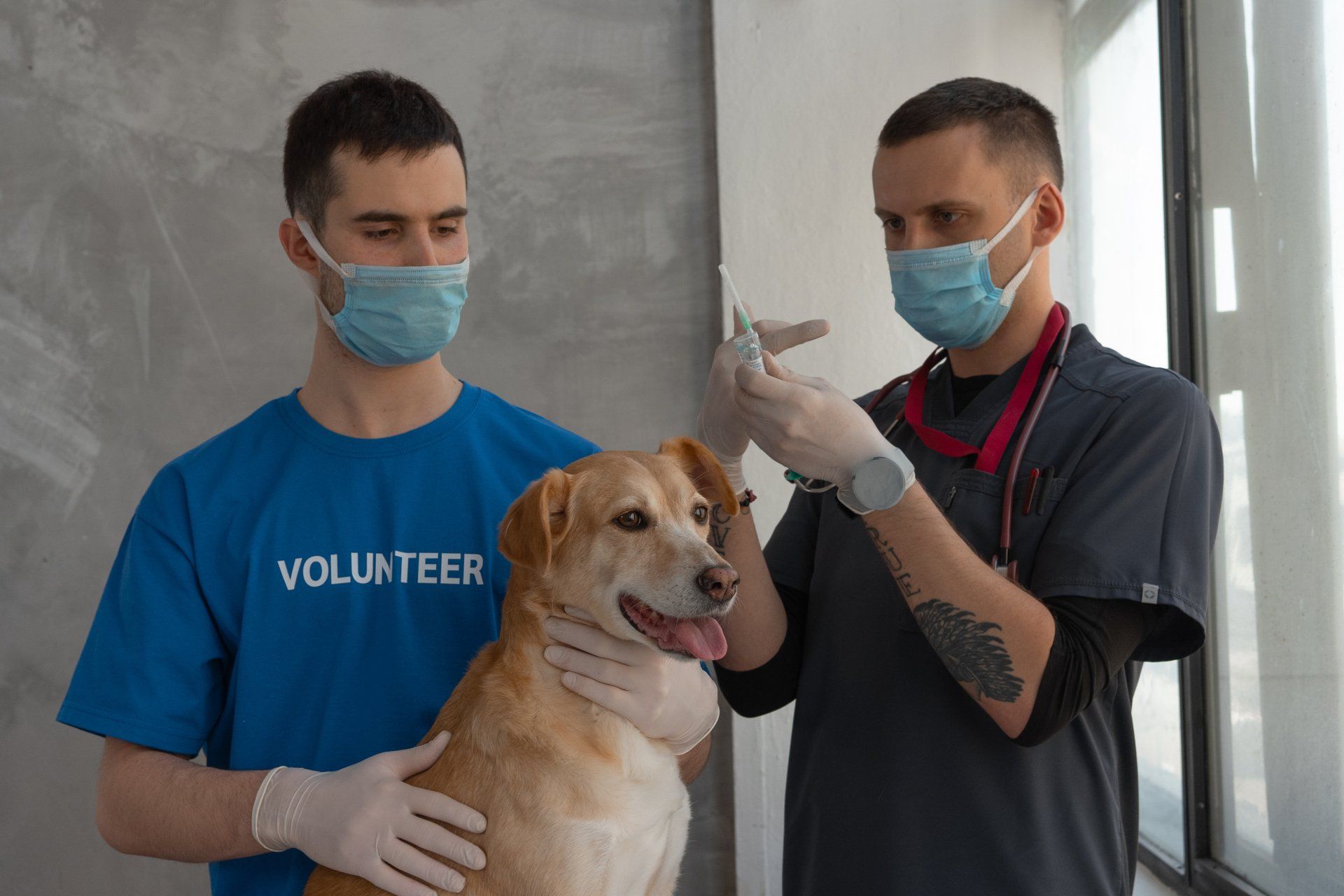Get in touch
555-555-5555
mymail@mailservice.com

Your First Dog
Congratulations on the newest member of your family! Whether you’re adopting a puppy, adult, or senior dog, there are some basics to know before bringing them home.
Find a veterinarian
Make an appointment with a veterinarian before you bring your new dog home. You don’t need to bring them to the clinic on day one, but having them evaluated within a few weeks is a good idea. Do some research before committing to a clinic - the best way to get an idea of a practice is by word of mouth referrals, but using online reviews is also helpful. If you’re not comfortable with your veterinarian, find a new one - in the long run it’s better to find someone you trust and enjoy working with.
It’s a good idea to know which emergency or urgent care clinic you would use for unexpected issues or if your normal clinic is completely booked and cannot accommodate you in urgent situations.
There are some objective markers of a high quality veterinary practice. For example, American Animal Hospital Association (AAHA) accreditation means the clinic has met a large number of rigorous standards which generally means the standard of care is exemplary. Fear Free certification indicates that the staff has gone through training to reduce the stress and anxiety your dog may experience at the clinic.
What to expect at your first veterinary visit
At the first visit, you’ll be able to meet your veterinarian and go over any concerns or issues you may have. Don’t hesitate to ask anything! Coming with a list of questions can help keep you focused. A member of the team will ask you questions about your dog as well. Bring any paperwork you received so the veterinary team can figure out what tests and vaccines are recommended.

Vaccines
The core vaccines include Rabies and a combination vaccine called Distemper. Rabies is legally required since it is a fatal disease that can be transmitted to humans. Distemper is a combination of several viruses that cause upper respiratory, diarrheal, and neurologic conditions.
Additional vaccines recommended for your dog will depend on where you live and your dog’s lifestyle. For example, dogs can be vaccinated against Bordetella bronchiseptica, a bacteria that can cause infectious tracheobronchitis or kennel cough. Other elective vaccines include those for Leptospirosis and Lyme disease. Leptospirosis is a bacterial infection spread through urine-contaminated water causing significant illness; Leptospirosis can be transmitted from dogs to humans. Lyme disease is a tick-transmitted bacteria that can cause joint and kidney issues. There is also an influenza vaccine available for dogs.
Most of the above-described vaccines require booster shots spaced several weeks apart. Mild adverse vaccine effects are common and include soreness and lethargy. Less common side effects include facial swelling, hives, and gastrointestinal upset like vomiting and diarrhea. It is rare to have any sort of long-term side effect from vaccines. If your dog has a history of vaccine reactions, pre-medication with diphenhydramine can be useful.
Testing
The most important test done at a veterinary visit is a complete physical examination. Your veterinarian will check your dog from nose to tail, paying special attention to your areas of concern. Other routine testing in dogs includes yearly fecal sample checks for intestinal parasites and a blood test for heartworm. Often the heartworm test also screens for exposure to several tick-transmitted illnesses including Lyme.
Depending on the age and health of your dog, other tests may be recommended. For example, if your dog has a lump, your veterinarian will likely recommend sampling it by needle biopsy. Senior blood work is generally recommended in older dogs. If you notice your pet limping or your veterinarian thinks a joint feels not quite right, x-rays may be in order. Following the advice of your veterinarian will help determine the best care for your dog.
Routine medications
All dogs should be on year-round flea, tick, and heartworm prevention. There is a wide variety of products including all-in-one chews, long-acting flea and tick collars, spot-on topical products, and separate oral products. The choice of product depends on where you live and your pet’s lifestyle - a dog that goes on hikes in the woods will have different requirements than a dog who spends most of their time on the couch and walking on sidewalks. Make a plan with your veterinarian to fit your dog’s needs.

Feeding
Dogs are generally fed twice daily, once in the morning and once in the evening. Feed a commercially available, well-balanced diet appropriate for your dog’s size (small, large, or giant breed) and life stage (puppy, adult, senior). In general, diets that have undergone feeding trials to meet the requirements of the Association of American Feed Control Officials (AAFCO) are preferable over ones that are simply formulated to meet certain nutrient profiles without testing. If you ever need to switch your dog’s food, it’s best to do so gradually over the course of a week or so.
Insurance
Pet insurance is most valuable before any pre-existing conditions pop up. Signing up for pet insurance and having it come into effect even before your first veterinary visit is ideal. Many pet owners think of pet insurance after a significant injury or illness, but by then it’s too late! Make sure to research and thoroughly understand the plan you have to take full advantage of it.
Obedience and Training
No dog is too young or old to start obedience training. Even seasoned dog owners should pursue basic obedience training so their dog can learn basic manners and socialize with other dogs and people.
Partner with your veterinarian
Your veterinarian and the staff at the clinic you choose are there to support you! Owning a dog is a lot of work and the team at your clinic is working for you to make your experience as easy and successful as possible. They work in veterinary medicine because of their love for animals and are happy to help.



